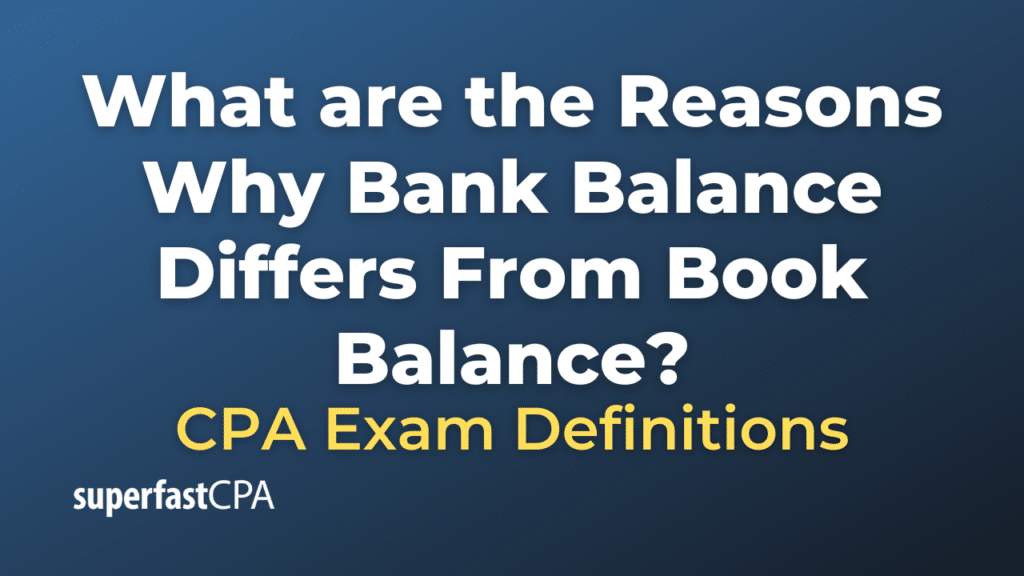Reasons Why Bank Balance Differs From Book Balance
Differences between the bank balance (as shown on a bank statement) and the book balance (as recorded in a company’s or individual’s own records) often arise due to timing differences or errors. Reconciliation between the two balances is typically done using a process called “bank reconciliation.”
Here are some common reasons why the bank balance might differ from the book balance:
- Outstanding Checks: Checks written by the company or individual that have not been cleared or presented for payment by the bank will reduce the book balance but not the bank balance until they clear.
- Deposits in Transit: Deposits made but not yet credited by the bank will increase the book balance but not the bank balance until they’re processed by the bank.
- Bank Service Charges: Fees charged by the bank (e.g., account maintenance fees, transaction charges) might be deducted by the bank but not yet accounted for in the books.
- Interest Earned: Interest credited by the bank on the account balance may not be immediately recorded in the individual’s or company’s books.
- Direct Debits or Credits: Automatic deductions (e.g., for loan payments) or direct deposits made to the account might not have been recorded timely in the company’s or individual’s accounting records.
- NSF Checks (Bounced Checks): A check received and recorded by a company might be returned by the bank due to insufficient funds in the payer’s account.
- Errors by the Bank: The bank might mistakenly credit or debit the account, causing discrepancies.
- Errors in the Books: Mistakes in recording transactions in the company’s or individual’s books can cause differences. This could include arithmetic errors, posting errors, or forgetting to record a transaction.
- Specialized Bank Deductions: The bank might deduct amounts for particular services, such as for bank draft services, wire transfer fees, or currency conversion charges.
- Timing Differences: Due to cut-off times and processing delays, transactions made near the end of the month might appear in the subsequent month’s bank statement.
- Unauthorized Transactions: Fraudulent or unauthorized transactions on the bank account can cause a difference.
- Electronic Fund Transfers (EFT): Automatic transfers set up for payments like utilities, insurance, etc., may be deducted from the bank account before they’re recorded in the books.
When differences are noted, it’s essential to perform a bank reconciliation to identify and rectify any discrepancies. This ensures that the company’s or individual’s financial records are accurate and complete.
Example of the Reasons Why Bank Balance Differs From Book Balance
Let’s walk through a simple example of a bank reconciliation to understand why the bank balance might differ from the book balance.
ABC Company’s Bank Reconciliation for the Month of March
Bank Statement Balance as of March 31: $10,000
Company’s Cash Book Balance as of March 31: $9,650
Reconciliation:
- Outstanding Checks: ABC Company issued checks totaling $1,200 that have not been cashed or cleared by the bank as of March 31.
- Adjusted Bank Balance: $10,000 – $1,200 = $8,800
- Deposits in Transit: ABC Company deposited $750 into the bank on March 31 afternoon. This deposit was not reflected on the bank statement since it was after the bank’s cut-off time.
- Adjusted Bank Balance: $8,800 + $750 = $9,550
- Bank Service Charges: The bank deducted a $25 fee for monthly maintenance, which ABC Company hasn’t recorded yet.
- Adjusted Book Balance: $9,650 – $25 = $9,625
- Interest Earned: The bank statement showed that ABC Company earned $10 in interest for March, which they hadn’t recorded in their books yet.
- Adjusted Book Balance: $9,625 + $10 = $9,635
- Error in the Books: ABC Company realized that they mistakenly recorded a $50 check as $500 in their books. The error needs a correction of $450.
- Adjusted Book Balance: $9,635 + $450 = $10,085
After adjusting for these items, we find that:
- Adjusted Bank Balance = $9,550
- Adjusted Book Balance = $10,085
There’s still a difference of $535. This means ABC Company will need to further investigate to find the reason for the discrepancy and make necessary adjustments. Maybe there’s another transaction they’ve missed or an error they haven’t caught yet.
In real-life scenarios, bank reconciliations might involve more items and more complex adjustments. This process is crucial for ensuring that financial records are accurate and that there’s no fraud, oversight, or substantial error in the company’s transactions.














